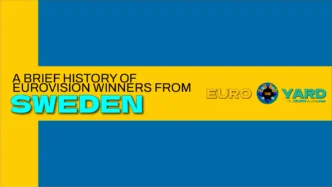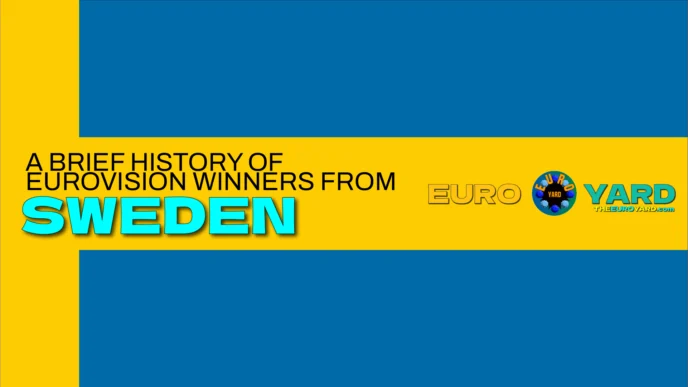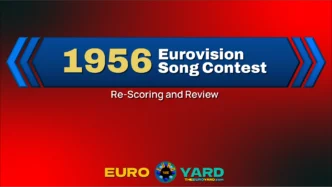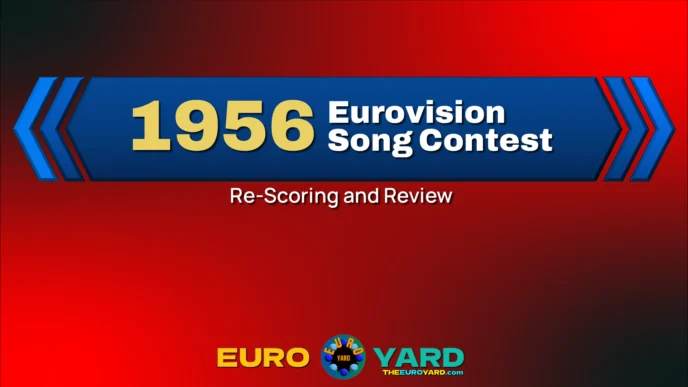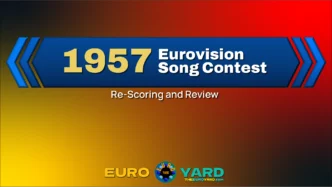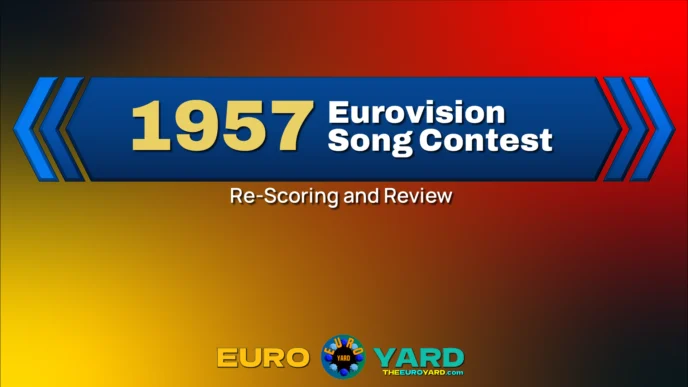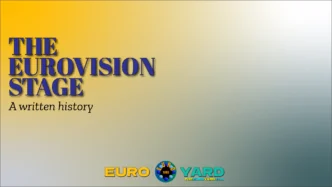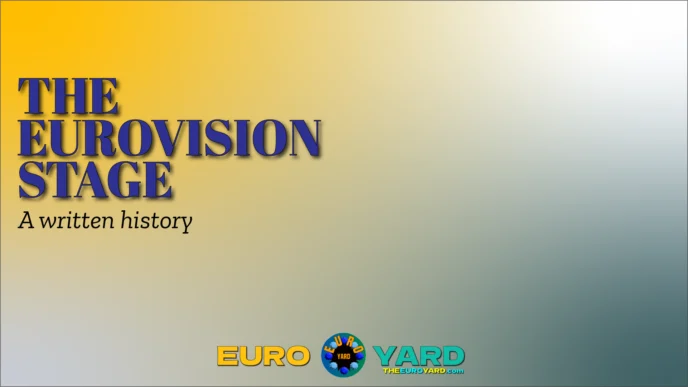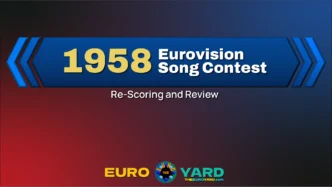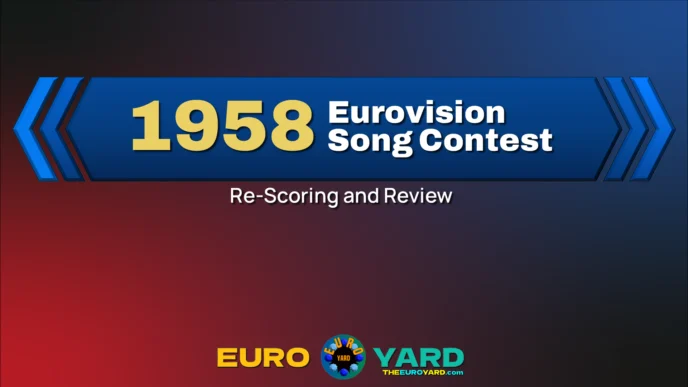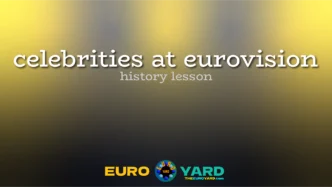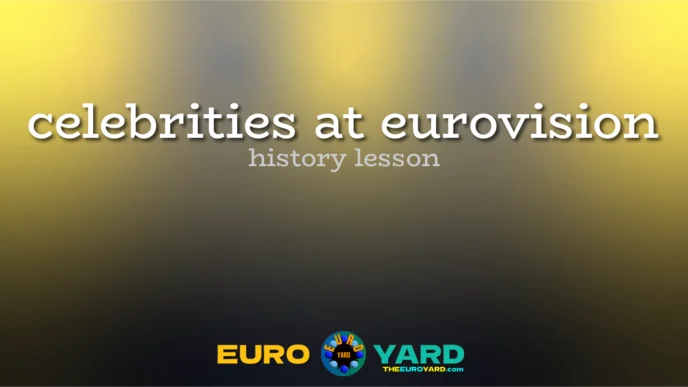Sweden hosting Eurovision has become something of an institution. In 2024, they will have hosted the Eurovision Song Contest for a seventh time, which will tie with Ireland for second-place on the all-time list. Their host years tend to make a big splash, so let’s take a look at what the Swedish have contributed to the evolution of this production.
Sweden Hosting Eurovision: The Winner’s Circle
Sweden has won Eurovision seven times, tied with Ireland for the most victories ever. Each nation also produced both two-time Eurovision winners, Loreen (Sweden) and Johnny Logan (Ireland).
Sweden’s first win, very notably, was in 1974 with “Waterloo” by future international sensations ABBA. However, unlike Sweden, Ireland did something that may never happen again: they won the contest three years in a row from 1992 to 1994. For all of their success, Sweden has not yet produced a back-to-back winner.
1975 Eurovision Song Contest: Stockholm
Following the first-ever Swedish victory at Eurovision, the contest came to Stockholm in 1975. It was presented by Karin Falck, still kicking at the age of 92 as of 2024. This was the only of Sweden’s hosting years where the official host broadcaster was Sveriges Radio; all others in the future would be by SVT (Sveriges Television).
Turkey made their grand entrance to the contest in 1975, a year that saw The Netherlands, another country that is no stranger to hosting Eurovision, win the prize. Notably, it was also the first year that “douze points” came to the contest, with yet another change to the scoring system. This one, however, stuck around for decades until the jury vote and televote were separated in 2016 (another Swedish hosting year).
Right away, Sweden went the comedy route. The intro to the 1975 contest featured a series of brief sketches on the history of Sweden, from primitives trudging through the snow, to Vikings, to people in silly wigs. It may not seem like much, but to that point, it was unexplored terrain. The postcards also featured personal looks at the singers, having fun painting artwork of themselves and their national identity. As we already established in another article, postcards were not an every-year occurrence in the 1970s, but Sweden did more with them than any prior country. These may seem like small things, but even back in 1975, Sweden put its own stamp on Eurovision.
1985 Eurovision Song Contest: Gothenburg
With Sweden hosting Eurovision in 1985, the quality of the production took a huge step forward. Other nations built off of and improved on their efforts in 1975, but when Sweden got the contest back, they put their own unique spin on it again. Famously hosted by former Eurovision contestant Lill Lindfors, she was the first to open the show with a musical number, a tradition that, for the most part, has continued until the present day.
The set for the show in Göteborg was bright and modern, showing a lot of creativity, neon lights and all. Their postcards were to date the only ones to feature the song’s composers and writers as opposed to the performers. However, what Eurofans likely most remember about this 1985 contest was the Lindfors wardrobe malfunction, when she rounded a corner on-set and her skirt ripped off, leaving the crowd equal parts amused and aghast. As it turns out, this was a scripted gag, showing that Sweden was not going to shy away from being edgy. This paid off for Lindfors, as she was voted the top presenter of the decade by Eurovision viewers.
1992 Eurovision Song Contest: Malmö
1992 was the first of (at least) three Eurovisions to be held in Malmö. Hosted by Lydia Capolicchio and Harald Treutiger, this show served Scandinavian culture with a mock-up of the bow of a Viking ship on the stage.
The 1992 live grand final was relatively unremarkable and not memorable, other than for the Viking ship in the background. Hey, they can’t all be winners. While Sweden did not necessarily advance the quality of the production when they hosted for the first time in Malmö, they kept with the existing developments of the time and put forward another modern show.
2000 Eurovision Song Contest: Stockholm
In 2000, the contest returned to Stockholm for the first time in 25 years. The Swedish national broadcaster, SVT, made a concerted effort to fully modernize the contest. While their changes were notable, this was in the midst of a period of great change for Eurovision. 1999, the year where Charlotte Nilsson (Perrelli) won, was the first without a live orchestra. It was also the first contest since the “native language” rule was lifted. In many ways, the Eurovision Song Contest already modernized by the time Sweden got their hands on it again; Sweden just furthered the process.
SVT put the show in a big arena, dialed up the glitzy lights, and gave the contest a new logo. Though not there yet, the contest was evolving into a loud, modern concert, moving far away from the days of being a black-tie formal. The contest we witnessed in 2000 was close to something we would recognize today.
2013 Eurovision Song Contest: Malmö
Eurovision returned to Sweden’s third-largest city in 2013. The contest was hosted for the first time by Swedish television personality Petra Mede, and she did a solo show from Malmö; the city hosted Eurovision for the second time.
The 2013 contest had the memorable butterfly theme throughout its cutaways and postcards, with the slogan “We Are One.” The postcards, by the way, were quite good: they were cinematic features of the performing artists, and the butterflies were in the colors of the national flags.
2013’s host year in Sweden was also not without noteworthy happenings. Eric Saade, a former Swedish contestant and this year the green room host, had some choice words to describe Petra, leading several broadcasters to cut the comments out of the show. Neighboring Finland made waves with their performance, which was a commentary on supporting same-sex marriage. Krista Siegfrids kissed another female singer at the end of the song, which got a big applause from the crowd, but led to Turkey declining to air the contest.
2016 Eurovision Song Contest: Stockholm
2016, in Stockholm, was notable for providing the Eurovision community with one of the best hosting duos of all-time. The previous year’s winner, Måns Zelmerlöw, and 2013 host Petra Mede had great chemistry throughout all three live shows. Perhaps the crown jewel of their co-hosting performance was their grand final interval act, a star-studded song about how to win the Eurovision Song Contest. “Love, Love, Peace, Peace” is required viewing for any fan, and the song set a very high bar for future host countries.
The contest itself saw a major change to the voting for the first time in 1976, in which the televote and jury votes from each country split and were separately announced. The televote score announcement would later be refined (which is to say, dragged out for dramatic effect), as Måns and Petra flew through the first handful of results.
Sweden again kept with the modern trend of cinematic postcards, this time coupled with even more visually-appealing on-screen graphics.
2024 Eurovision Song Contest: Malmö
2024 will be the next chapter in Sweden hosting Eurovision, live from Malmö for the third time. Petra Mede will make her third appearance as host, behind only Britain’s Katie Boyle for most times hosting Eurovision. She will be joined by actress Malin Åkerman.
How will the show go? One can count on it being a well-done show, because Sweden has never done a bad job.


